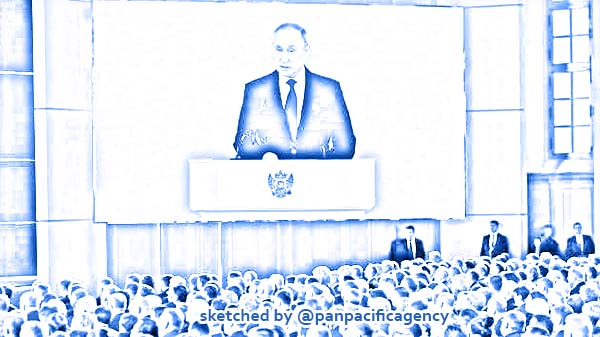Putin takes a big step closer to being Russia’s president beyond 2024

Vladimir Putin, Russia’s president, as he speaks during his annual state of the nation address in Moscow, Russia, on Wednesday, Jan. 15, 2020. Bloomberg. Sketched by the Pan Pacific Agency.
MOSCOW, Mar 11, 2020, CNBC, TASS. On Wednesday, Russian Parliament voted in favor of changes that would allow Putin to run for the presidency again when his current term in office ends. Putin has run Russia for 20 years, whether as president or prime minister. He has alternated between the roles as the constitution currently does not allow for presidents to serve more than two consecutive terms in office.
Russia’s parliament backed changes to the constitution Wednesday that would allow President Vladimir Putin to run for president again in 2024. Russia’s Federation Council (the upper house of parliament) has approved a bill amending the country’s Constitution at a plenary meeting on Wednesday. A total of 160 senators voted in favor of the bill, while one voted no, and another three abstained, TASS reported.
This day early Russia’s State Duma (the lower house of parliament) has passed the third and final reading of a bill amending the country’s Constitution. A total of 383 lawmakers voted in favor of the bill, and no one voted ‘no.’ As many as 43 legislators (members of the Communist Party’s faction) abstained from voting. Other parliamentary factions supported the document, according to the TASS.
Putin has run Russia for 20 years, whether as president or prime minister. He has alternated between the roles as the constitution currently does not allow for presidents to serve more than two consecutive terms in office.
The proposed amendment to the constitution would remove this barrier to Putin running for office again in 2024. The country’s constitutional court now has to approve the changes before a national referendum is held on the amendment (and others, including an expansion of the parliament’s authority) on April 22, CNBC reported.
“Putin now looks likely to run for president again when his term expires in 2024, rather than retaining power by transitioning to an alternative office. The amendment will almost certainly get the required approval from the parliament, the court, and the public in the vote planned for 22 April,” analysts at Eurasia Group said in a note Tuesday.
In January, Putin outlined constitutional reforms including changes to limit presidential powers and to hand more control to parliament. Without warning the then-government under Prime Minister Dmitry Medvedev resigned to facilitate the changes.
The reforms raised eyebrows with analysts questioning Putin’s motives, and whether he was trying to extend his grip on power or carve out new powers for himself if he left office.
On Tuesday, however, Putin appeared in parliament and gave his support for the abolition of limits on presidential terms, and arguing that a strong presidential power was crucial for Russia’s political stability, security and economy at a time of uncertainty.
“I think and I strongly believe that a strong presidential vertical for our country, for Russia is absolutely necessary. And today’s economic situation, as I have just pointed out, and the situation in other spheres such as security is another reminder,” Putin told parliament.
“First of all, it is necessary for stability. Of course, there are other options, which we are well aware of, such as parliamentary government, which is widely common in the world. However, at the current stage of our development, it is not suitable for us.”
Eurasia Group’s analysts remarked that while Putin remains popular, “public weariness with the same leader is bound to grow over time.”
“He remains popular (54% of the public support him staying on, according to one poll), and does not face a serious internal challenge. Putin made clear on Tuesday that he likes the basic centralized power structure. As president, the political system will not have to try to accommodate two power centers. The track record of such arrangements in the Eurasia region is mixed, and Putin may have decided the dangers outweigh the benefits.”